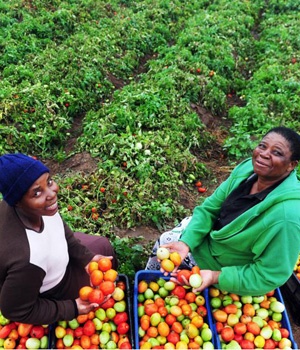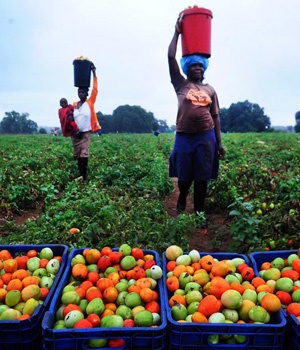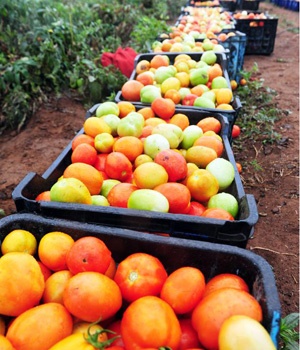
The next time you add All Gold tomato sauce to your meal, think about this: it’s probably made from tomatoes grown in Limpopo by two women who are among the country’s most successful new farmers.
It is a drizzly morning at Nwanedi Farms in Tshamutumbu, north of Thohoyandou.
Labourers are focused on their work, eyes fixed to the ground, their hands plucking tomatoes. A truck from KwaZulu-Natal is waiting to load up crates of the freshly picked fruit. The work must go on, despite the rain.
From a distance, Esnath and Angelina Mulaudzi look no different from the rest of the stooped work crew. With rain in their eyes, and boots caked in mud, they reluctantly stop their work to honour our appointment.
Sisters-in-law Esnath and Angelina are the owners of the 20ha farm.

They got together to grow their business in 2014. Today they employ 50 people and this year alone they will supply Tiger Brands with 200 tons of produce. They export to clients in Mozambique and supply another South African company with butternuts.
They don’t mind getting their hands dirty. After all, it is by the sweat of their brows that they are today proud owners of a huge tomato plantation.
Esnath and Angelina welcome us with broad smiles. They understand very little English – they only speak their mother tongue, Tshivenda – but their actions speak louder than words.
A translator is found and we begin our halting interview under a tree, where we’ve taken refuge from the worst of the rain. There is no doubt about their achievements, the joy they take in their success and their enthusiasm for crop farming.
“It was not easy starting out, but all the hard work is finally paying off and not only for us, but for the family members of those we’re employing as well,” says the 55-year-old Esnath.
The Mulaudzis clearly care about the welfare of their employees and are determined to create jobs.
“We want to expand so that we are able to employ even more people,” says Esnath. “Job opportunities are very scarce and farming is one of the biggest employers locally.”
Perhaps it is the memory of their humble beginnings that makes these former small-town women understand the challenges of taking care of a family’s basic needs.
Twenty years ago, Esnath was a hawker selling clothes at social grant payout points around the Mutale area. Angelina worked in a family butchery.
Then Esnath had an idea. Her husband had half a hectare of land close to their village in Muswodi and she decided to try vegetable farming.
“I planted my first batch of tomatoes in 1994 after saving some money from selling clothes. I also planted cabbages and butternuts, which I tended with help from my husband and family,” Esnath says.
“I made some money, which was not so bad and felt motivated to do more. With the support of my family and my growing passion, I carried on planting vegetables, year in and year out, and selling my produce to hawkers at informal markets.”
A neighbouring female farmer who took an interest in Esnath’s efforts advised her to stick mainly to tomatoes as they have a bigger market.
“To this day, I am thankful for her motivation and valuable advice,” Esnath mentions.
By 2011, Esnath was ready to take the next big step.
“I got a loan of R50 000 when I saw the need to expand and I planted on 3ha. The produce was overwhelmingly good and inspired me to do even more.”
The 57-year-old Angelina, who started her farming career later, planted her first crop on 2ha of family-owned land. She also started selling her produce to hawkers and soon quit her job at the butchery.
Then, Angelina came across TechnoServe – an international not-for-profit organisation that promotes “business solutions to poverty” by linking people to information, capital and markets.
“In 2013, through the advice I got from TechnoServe, I got a R200 000 loan. This helped me expand, then TechnoServe got me a contract to supply 1ha worth of tomatoes to Tiger Brands,” Angelina explains.
From there, things moved fast. Last year, Tiger Brands required more tomatoes and TechnoServe advised Angelina and Esnath to team up.

The budding commercial farmers got together, installed water pumps and routed irrigation water from the nearby Nwanedi River. They were trained in all aspects of farm management, from book-keeping to buying seeds.
“With the demand for tomatoes, it made sense to come together and acquire more land,” notes Esnath.
There were pitfalls along the way and, like all crop farmers, they are at the mercy of the weather.
“There were severe rains in 2014 that led to serious soil erosion, but we recovered quickly and were back on a roll in no time,” says Esnath.
Today they farm on 20ha, some of which is family owned. The rest is leased from the community property association. They supply Tiger Brands with processing tomatoes, the kind that go into bottles of tomato sauce, paste and sauces.
During the time that we’ve been talking, 1 350 crates of the ripe, red tomatoes are ready to be loaded on to the truck. The seasoned businesswomen do not reveal their annual turnover – but by the time the truck leaves, they will be at least R100 000 richer.
The Mulaudzis are more comfortable describing how their personal lives have changed and are not shy to show us the rewards of their hard work. They have both bought themselves new cars. Esnath proudly points to her Toyota bakkie and Angelina’s Isuzu is parked at home.
“I am proud to say today that I have extra money in the bank, which is something I never had before I became a commercial farmer,” says Esnath.
“I am able to put my children through university, I bought some more land for farming and I am expecting to pay off my bakkie soon,” adds Angelina




 Publications
Publications
 Partners
Partners








